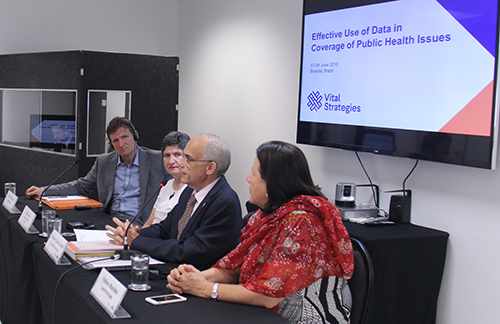“At least 49 victims of rape are treated daily by the health network” was the headline in Brazil’s largest newspaper, Folha de S.Paulo, just hours after an intensive two day workshop focusing on using public health data more effectively to inform the public. The workshop, co-facilitated by Brazil’s Ministry of Health and Vital Strategies, was held in Brasilia.
The workshop, organized as part of the Bloomberg Philanthropies Data for Health Initiative, brought together public health communication professionals from the Ministry with journalists, with the goal of improving how national media uses data in important health stories.
The workshop comes at a time when Brazil is coping with multiple large-scale, complex public health issues. While Zika is grabbing headlines, the Ministry continues to confront chronic, non-communicable problems such as violence against women. Fatima Marinho- Brazil’s Director of Non-Communicable Diseases, Surveillance and Health Promotion- noted during the training that the ability for journalists and communication professionals to interpret data better, convey complex problems visually to audiences, and use data to drive engaging and compelling articles is critical to getting necessary attention to address these issues.

Journalists who attended this workshop agreed that the effective incorporation of data into storytelling is necessary in reaching their readers and audiences.
Participants also discussed the importance of the relationship between journalists and Ministry of Health communications professionals, who often supply data and are a point of contact for journalists who are creating or digging further into stories.
The workshop created common ground among these two groups by identifying coming “data story” themes such as trends, outliers and cycles and how these approaches to understanding data can be combined with engaging, personal anecdotes and stories to build compelling and accurate news stories.
Dr. Souza closed the workshop by reminding her workforce and the attending journalists that, “We’re dealing with health. These aren’t just numbers; they’re the keys to unlocking the solutions, and the means to preventing future occurrences of rape, Zika, among other threats to the public’s health. When I see the numbers from years past, I can nearly cry. What we can do moving forward is inform and empower the public to be aware and make healthy choices.”